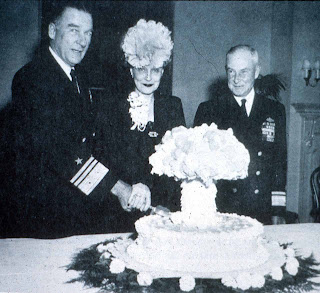
Posted on 05/21/2016 6:33:24 AM PDT by C19fan
A century ago, the two greatest fleets of the industrial age fought an inconclusive battle in the North Sea. The British Grand Fleet and the German High Seas Fleet fielded a total of fifty-eight dreadnought battleships and battle cruisers, ships over the twice the size of most modern surface combatants. Including smaller ships, the battle included 250 vessels in total.
(Excerpt) Read more at nationalinterest.org ...
That sounds like a distinguished Naval career.
But Nagasaki...surrendering?
“Here, Americans, accept this box of ashes & rubble in token of our surrender. We couldn’t find anything larger.”
(The atomic bombings were necessary, don’t get me wrong.)
The battle ship is almost 3x the displacement of the destroyer.

One could argue that all a nation really needs for defensive purposes is a large submarine fleet. Submarines are cheaper, new diesel electrics stay down quite long and are inherently quieter than nukes. But it isn’t as sexy as having a big surface fleet of targets.
20,000 yards equals 9.84 nautical miles.
Every destroyer and cruiser-sized ship that has been hit by even ONE bomb, cruise missile, cannon shell or dud weapon since WWII has lost power, propulsion, command, control, combat information center, conning or communications.
Or all of them. For periods from 1/2 hour to days. And several have sunk, been blown nearly in two.
NO destroyer-sized or cruiser-sized ship in ANY Navy worldwide has survived “combat” since WWII. Even the ones hit by a dud weapon have been unable to fight, flee, or forge ahead. They have all been left foundering.
Yes it did matter;
at the time, Admiral Jellicoe was described as, “The man who could lose the war in an afternoon.”
I wasn’t talking in terms of radio coordination but the subs at Jutland were to engage first, tie up the surface ships in anti-sub maneuvering, and thereby prevent accurate counter fire. But they came late or otherwise get the Brits to break their lines.
But, what about their colonies and trade routes?
I read a great account of that battle, and W.W.I sea battles and such. The book by Robert Massie’s “Castles of Steel”, went into great detail of all of the sea battles in that war.
It was called a text book battle, not so much one of destruction but one of tactics. In and of itself it had little effect on the war. What did happen was that the Kaiser not wanting to lose any of battle fleet never again let the German Fleet out to battle the British Fleet again.
I don’t understand your question in light of my post.
I’m having a laugh at the triple redundancy in such a short post.
The impressively large size of the ships at Jutland can be further illustrated by limiting the comparison to cruisers. The modern US Navy's Ticonderoga class cruisers are less than ten thousand ton displacement and carry guided missiles as their main armament, with but a single vestigial five inch gun of limited combat value.
In contrast, the British armored cruisers at Jutland were substantially larger and carried guns of over nine inches. The battlecruisers were larger yet, with Britain's HMS Lion, for example, rated at over 30,000 ton displacement when loaded and carrying eight thirteen and a half inch guns as its main battery.
In sum, the warships at Jutland were impressively large when compared to modern naval gunships.
For what it’s worth,
Adolph Hitler’s analysis (in a meeting with his Chiefs of Staff, as recorded in Winston Churchill “The Second World War, Vol. 1: The Gathering Storm”):
“If in the First World War we had had two battleships and two cruisers more, and if the battle of Jutland had begun in the morning, the British Fleet would have been defeated and England brought to her knees.”
Winston Churchill’s analysis (in a footnote to this quote):
“Hitler was evidently quite ignorant of the facts of Jutland, which was from beginning to end and unsuccessful effort by the British Fleet to bring the Germans to a general action in which the overwhelming gun-fire of the British line of battle would have soon been decisive.”
In addition, a loss at Jutland would have dealt a major psychological blow to the losing country. This might have led to peace negotiations or to an unraveling of domestic support for the war. Germany's leaders realized after Jutland that the potential for such a turn precluded ever again risking a fleet action.
#21 You mean that Wally and the Beav saved the day at Jutland? : )
I reviewed the post. The problem, then, is your ignorance, not my post. Perhaps you can get someone to explain to you the difference between 1) German colonies, 2) German trade routes and 3) British trade routes.
Cruisers were capable force projection ships. But when the heavies engaged, they needed to get clear. Beatty engaged Hipper too closely and took a beaTing. He should have lured Scheer more quickly toward Jellicoe and the main fleet.
Disclaimer: Opinions posted on Free Republic are those of the individual posters and do not necessarily represent the opinion of Free Republic or its management. All materials posted herein are protected by copyright law and the exemption for fair use of copyrighted works.